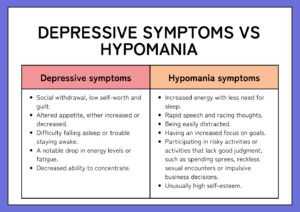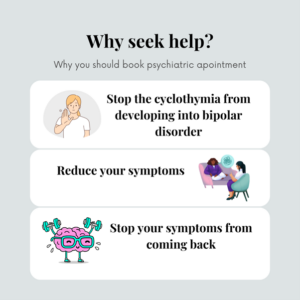
You might have left your doctor’s office with a diagnosis of Cyclothymia, or you might suspect you have it, but you aren’t certain what this term actually means. How will it impact your life? What steps can you take to address the challenges it might bring? If you’re seeking answers to these questions, you’ve come to the right place.
Cyclothymia is a bipolar-related mood disorder characterized by chronic fluctuations between mild depressive symptoms and periods of elevated mood. Individuals diagnosed with cyclothymic disorder will, over the years, encounter fluctuating moods. These can span from mild depressive states to periods of elevated emotions, or emotional highs.
Despite being one of the more common types of bipolar disorder, Cyclothymia is often overlooked and rarely diagnosed clinically. However, for those receiving the diagnosis it can often feel dismissive, as if the effects of your symptoms on your daily life are being underestimated. However, the reality is that untreated cyclothymia can seriously impact your life, especially if left untreated.
Symptoms
Symptoms of cyclothymia are similar to those of bipolar I or bipolar II disorder, but they’re less severe. People with cyclothymia can usually manage their day-to-day activities, though they may struggle at times.
The presentation of symptoms of cyclothymia is very different between diagnosed individuals. Some people with cyclothymia may feel mildly depressed almost all the time, with only a few short periods where they feel unusually upbeat and energetic (hypomanic). Others might experience rapid changes in mood, going from feeling down to feeling overly happy several times within just one day.
Although cyclothymia involves both mild depressive and mild elevated (hypomanic) moods, these mood changes often blend together without a clear switch from one to the other. It’s not always easy to tell when one mood ends and another begins, and sometimes, people might feel symptoms of both at the same time.
The nature of the elevated moods in cyclothymia can also differ from person to person. While some might feel positively energetic and productive (a “good” mood), others might feel restless, easily annoyed, or irritable, which can lead to problems or negative consequences.
Moreover, during periods when someone is feeling down (mildly depressed), they might also show signs of being hypomanic, like being more active or irritable than usual. This can make their depression seem more agitated or restless, rather than just sad or lethargic.
If you notice any of the symptoms don’t hesitate to book a consultation at TEMA Therapy Center in Fort Lee, New Jersey. Not from New Jersey or NYC? Book an online session.
Causes and prevalence
The exact causes of cyclothymic disorder are not fully understood, but a combination of genetic, neurobiological, and environmental factors are believed to play a role. Additionally, major depression, bipolar disorder, and cyclothymia often occur together in families.
Cyclothymia usually begins early in life and it affects 0.4%-1% of the population, with some estimates that its prevalence might be as high as 5%. Men and women are equally affected.
Because many of the symptoms of cyclothymia overlap with other mental health conditions, many individuals may go unrecognized or are misdiagnosed with different mood disorders, like depression.
Getting treatment
Even though the emotional highs and lows associated with cyclothymia are milder compared to bipolar disorder, getting support to handle these symptoms is essential. This is because they can disrupt daily functioning and because they can disrupt daily functioning and may increase the likelihood of developing bipolar I or II disorder in the future.
Options for managing cyclothymia involve engaging in psychotherapy NJ, using prescribed medications, and maintaining regular check-ins with a healthcare provider.
If you notice signs of cyclothymia in someone close to you, it’s imp njortant to have an open and sincere conversation about your observations and worries. While you cannot force them to get professional help, you can express your support and assist in locating a skilled healthcare professional or therapist.
At TEMA Therapy Center in New Jersey, our team includes 11 versatile and highly trained therapists.. We understand that the effectiveness of therapy is directly related to how well you click with the therapist. Therefore, with us you can schedule a free 15-min consultation with a therapist of your choice.
No matter where you are, you’re not alone. Our online therapy sessions extend beyond New Jersey (NJ), ensuring you have access to the support you need from the comfort of your own home.


